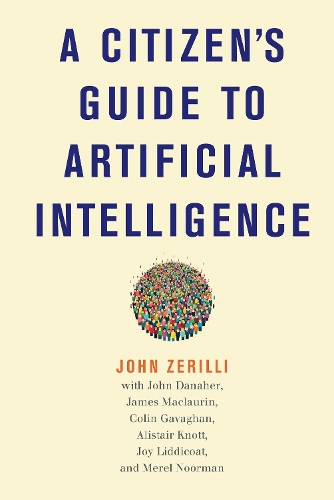
A Citizen's Guide to Artificial Intelligence
(Paperback)
Available Formats
Publishing Details
A Citizen's Guide to Artificial Intelligence
By (Author) John Zerilli
By (author) John Danaher
MIT Press Ltd
MIT Press
9th December 2025
United States
Classifications
General
Non Fiction
Physical Properties
Paperback
232
Width 152mm, Height 229mm
Description
A concise but informative overview of AI ethics and policy. A concise but informative overview of AI ethics and policy. Artificial intelligence, or AI for short, has generated a staggering amount of hype in the past several years. Is it the game-changer it's been cracked up to be If so, how is it changing the game How is it likely to affect us as customers, tenants, aspiring homeowners, students, educators, patients, clients, prison inmates, members of ethnic and sexual minorities, and voters in liberal democracies Authored by experts in fields ranging from computer science and law to philosophy and cognitive science, this book offers a concise overview of moral, political, legal and economic implications of AI. It covers the basics of AI's latest permutation, machine learning, and considers issues such as transparency, bias, liability, privacy, and regulation. Both business and government have integrated algorithmic decision support systems into their daily operations, and the book explores the implications for our lives as citizens. For example, do we take it on faith that a machine knows best in approving a patient's health insurance claim or a defendant's request for bail What is the potential for manipulation by targeted political ads How can the processes behind these technically sophisticated tools ever be transparent The book discusses such issues as statistical definitions of fairness, legal and moral responsibility, the role of humans in machine learning decision systems, "nudging" algorithms and anonymized data, the effect of automation on the workplace, and AI as both regulatory tool and target.
Reviews
With the explosive expansion of cloud computing capacity, mobile communication technologies, and the internet of things over the past couple of decades, AI systems have become an increasingly unavoidableindeed pervasivepart of our everyday lives. And yet, many of us have very little idea of how these technologies actually work, or of where, when, and how they are being used by law enforcement agencies, private companies, and governments. The authors of A Citizens Guide to Artificial Intelligence do a masterful job of opening a public conversation that promises to redress this troubling knowledge gap.
David Leslie, Ethics Team Lead, Alan Turing Institute
A Citizens Guide to Artificial Intelligence is a text that ought to be read widely. The books subject matter is highly relevant, and it provokes many probing questions that deserve further consideration on the part of the reader and broader society.
London School of Economics
Author Bio
John Zerilli is a Research Fellow at the Leverhulme Centre for the Future of Intelligence in the University of Cambridge and from 2021 will be a Leverhulme Trust Fellow at the University of Oxford.
